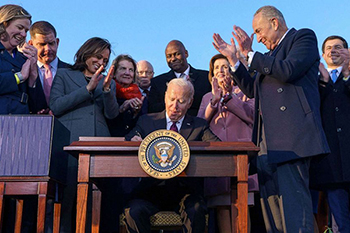Bipartisan Infrastructure Law
 Pending Applications - Charging and Fueling Infrastructure
Pending Applications - Charging and Fueling Infrastructure
The Charging and Fueling Infrastructure Discretionary Grant Program (CFI Program) is a new competitive grant program created by President Biden's Bipartisan Infrastructure Law to strategically deploy publicly accessible electric vehicle charging and alternative fueling infrastructure in the places people live and work.
CFI Program investments will make modern and sustainable infrastructure accessible to all drivers of electric, hydrogen, propane, and natural gas vehicles. This program provides two funding categories of grants: (1) Community Charging and Fueling Grants (Community Program); and (2) Alternative Fuel Corridor Grants (Corridor Program).
The Bipartisan Infrastructure Law provides $2.5 billion over five years for this program. The Department of Transportation plans for $700 million from Fiscal Years 2022 and 2023 to strategically deploy electric vehicle (EV) charging infrastructure and other alternative fueling infrastructure projects in urban and rural communities in publicly accessible locations, including downtown areas and local neighborhoods, particularly in underserved and disadvantaged communities (FY 2022 $300 million and FY 2023 $400 million).
In Houston, Mayor Turner is committed to deploying more EV charges in tracts with higher percentages of low-income households or minority populations. To rectify this imbalance, the City plans to leverage the more evenly distributed city facilities that will significantly increase the availability of charging stations in areas currently underserved.
- Houston seeks to deploy publicly accessible Electric Vehicle Support Equipment (“EVSE”) at City-owned libraries, community centers, and parks (about 81 project locations and 366 chargers in total).
The transportation sector contributes to nearly half of Houston’s community-wide emissions (47%), with a majority of those emissions coming from single occupancy vehicles. Addressing electric vehicle (EV) charging inequity among Houston communities is a top priority of the City of Houston to promote EV adoption in the private sector.
If awarded, the City will prioritize and direct 100% of CFI grant funding towards Top Priority (~13 sites) and High Priority (~14 sites) project locations within Justice40 Disadvantaged Communities (DAC) census tracts. The funds will also serve to strategically locate Direct Current Fast Charging (DCFC) stations based on proximity to Designated Alternative Fuel Corridors (AFCs) and high concentrations of Multi-Family Housing (MFH) units. The City of Houston will call for co-designing with the community.
These initiatives align with the City’s Climate Action Plan (CAP) and Resilient Houston Plan, both launched in 2020. These plans set a community-wide goal to reduce greenhouse gas emissions and achieve carbon neutrality by 2050. The expansion of fleet electrification and access to EVSE infrastructure are key components of these ambitious environmental goals. The City of Houston is applying for $15,000,000.00 to help build accessibility for EV charging stations throughout the community.